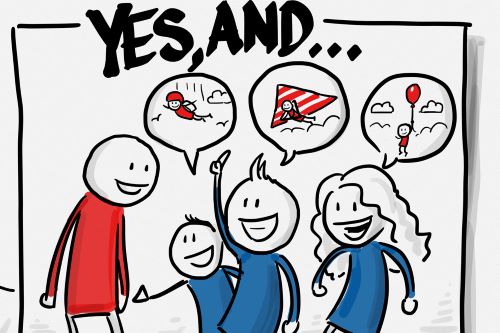When we think of a classic Dungeons & Dragons session, it’s easy to imagine meticulously planned encounters, intricate puzzles with specific solutions, and a dungeon master (DM) who knows every twist and turn in advance. However, there’s a different approach that can lead to some of the most memorable and dynamic gameplay: emergent play.
If you’ve been following this blog for a while you will know that I am a serious fan of this type of play. In fact, I design all my adventures with emergent play in mind.
Emergent play embraces the unpredictable nature of collaborative storytelling, allowing both players and the DM to experience genuine surprises. By designing encounters and puzzles without a predetermined solution, you create an environment where creativity flourishes, and every decision matters. In this article, we’ll explore how to incorporate emergent play into your D&D sessions and offer ideas for encounters tailored to a work-based D&D group.
What is Emergent Play?
Emergent play refers to a style of gameplay where outcomes are not entirely scripted, allowing new and unexpected possibilities to arise from the interactions between players, the environment, and the rules of the game. In D&D, this means creating scenarios where the players’ actions and decisions directly shape the story, often in ways that even the DM couldn’t have anticipated.
This requires a shift in mindset: rather than guiding players toward a specific outcome, the DM sets the stage and lets the players’ creativity lead the way. The result is a dynamic (chaotic), organic narrative that can evolve in real-time, keeping everyone at the table on their toes.
The Art of Writing Encounters with No Set Solution
Designing encounters and puzzles without predetermined solutions can be challenging, but it’s also incredibly rewarding. I believe that it’s actually significantly more satisfying than developing an adventure with everything though out. Here’s how you can do it:
Focus on the Situation, Not the Outcome
When crafting an encounter, begin by imagining a compelling and exciting situation rather than a specific end result. For example, instead of creating a puzzle with a single correct answer, think of a scenario that presents a problem the players need to solve. This problem can have multiple solutions, each depending on the players’ ingenuity. For me, the joy comes from the players creativity, rather than from my own perceived cleverness.
Example: The players stumble upon a village suffering from a mysterious curse. The curse could be lifted by several means: finding and destroying a cursed artifact, negotiating with a local spirit, or even making a difficult moral choice. The key is to avoid designing the “correct” solution in advance—let the players discover their own path.
Leverage the Players’ Skills and Backgrounds
Encourage players to use their characters’ unique skills and backgrounds to interact with the environment. When players feel that their choices and character traits genuinely impact the story, they’re more likely to engage deeply with the game.
Example: If the party includes a bard with a talent for persuasion, a fighter with a deep knowledge of military tactics, and a druid connected to nature, create scenarios where these skills can shine. The players might convince a rival faction to join forces, devise a clever ambush, or call upon local wildlife for help—all valid and rewarding solutions.
Introduce Dynamic Elements
Consider adding elements to the encounter that change based on the players’ actions or even based on random rolls. This can create a sense of unpredictability that keeps the session exciting.
Example: The players are attempting to navigate a treacherous mountain pass during a storm. The storm’s intensity could be both randomized and influenced by the players’ actions, such as using magic to calm the winds or making a risky decision to push forward despite the danger. The environment itself becomes a living, reactive part of the encounter.
Embrace Improvisation
By its very nature emergent play thrives on improvisation. As a DM, you have to be open to ideas and solutions that you hadn’t anticipated. Listen to your players, build on their suggestions, and use your improv skills to keep the story flowing. Often I create puzzles or encounters with absolutely no preconceived notions of how they might be solved. Instead, relying on improvisation alone to find the solution based on the reactions of the players.
Example: The players might decide to solve a puzzle by using an item or spell in a completely unexpected way. Instead of shutting down their idea because it wasn’t part of your plan, consider how it might work in the context of the game world. This approach not only rewards creative thinking but also reinforces the collaborative nature of D&D.
For some advice on improving your improv skills in a DnD context check out this video by Bob WorldBuilder.

Emergent Encounter Ideas for a Work-Based D&D Group
Given the nature of this blog I want to tie in some thoughts about using these concepts in a work-based D&D group. Here, you often have players with diverse levels of experience and varying amounts of time to dedicate to the game. Perhaps the normal tropes of the game aren’t apparent to the participants. Here are a couple of emergent encounter ideas that can engage everyone, regardless of their familiarity with D&D:
The Office Heist
The party is tasked with retrieving a critical piece of information from a well-guarded office building. The twist? Each player is assigned a different role within the company (e.g., security, HR, IT) and must use their “workplace skills” to navigate the environment. There’s no set way to achieve the goal—players can collaborate to come up with a plan that leverages their “professional expertise.”
The Corporate Rivalry
Two powerful companies are vying for control over a lucrative contract. The players must decide whether to sabotage the rival, broker a deal, or come up with a third option that benefits both parties. The encounter evolves based on the players’ decisions, alliances, and even office politics. To make this even more emergent, why not have the rival company played by an accomplice. This would give the negotiations an air of realism, while adding additional unpredictability to the encounter.
The Joy of the Unexpected
Emergent play in D&D transforms the game into a living, breathing narrative where anything can happen. By designing encounters without a fixed solution, you invite players to take the reins of the story, leading to unforgettable moments of creativity, collaboration, and surprise.
For work-based D&D groups, this approach can make sessions more inclusive. Also, engaging players at all skill levels and allowing them to contribute in unique ways. Whether you’re navigating a corporate heist or negotiating a corporate rivalry, the possibilities are endless when you let the story emerge naturally.
So next time you sit down to plan a session, consider leaving a few loose ends. Where will the adventure take you? You might just find that the best stories are the ones you never planned!



